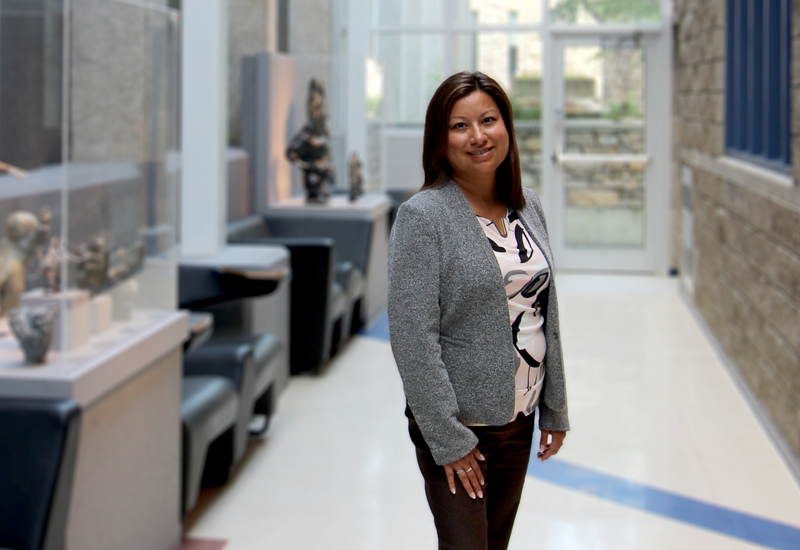
Finding her way
CeCe Baptiste shares her inspiring story of resilience.
CeCe Baptiste said the way she grew up, mostly in Saskatoon but with several important years on the Little Pine First Nation, informed her understanding of identity, which has shaped not only her career but her sense of responsibility to others.
“In the city, I didn’t feel connected to my culture, my language, my family, or my community,” Baptiste said. “Going home for a few years from grade nine to eleven helped me reconnect with who I was and feel proud to be Cree.”
Although Baptiste’s goal of a university education had been instilled in her at a young age with her mother holding three degrees and father also attending university, she found herself up against barrier after barrier.
At age 15, she was living on her own, going to high school and working to support herself with difficulties getting help from social services. Baptiste explained, “No one believed I just needed help to finish high school. They believed I would be a drain on the system.”
She also needed someone to advocate for her to get into the Adult 12 program at SIAST because neither the regular school system nor Adult 12 could accept her based on their admission requirements. “I hadn’t been out of school long enough to be accepted into Adult 12. They actually told me if I was pregnant, they could accept me,” Baptiste said. “It’s so easy to see how people fall through the cracks.”
Baptiste then had an additional barrier because she was denied university funding from her reserve at first. “My grade 12 transcript said Adult 12 even though it was a regular curriculum,” she explained.
“Education was always the goal. I knew I was smart. It was just how to get there.”
Baptiste wanted to study commerce at university as well as be true to her Indigenous background. She first received her Certificate in Indigenous Business Administration (CIBA) at the First Nations University of Canada. “The program was so successful in facilitating Indigenous business students through the education program,” she said. “When I reflect on my career, that cohort was a strong facilitator in pulling me into being a community leader.”
"I feel as business leaders we have the responsibility to meet Indigenous communities in the middle and identify those initiatives that will achieve the goals of both sides because that’s when beautiful things happen."
With CIBA, Baptiste was able to enter Edwards in third year and chose a double major in finance and economics. She received her B.Comm. in 2004, and went on to obtain a professional accounting designation.
As she started her career, Baptiste said she had trouble knowing how much of her authentic self to bring to the workplace. “It was a struggle at first,” she said. “And I don’t think that’s uncommon for many people graduating university and starting their career—a reality faced by both Indigenous and non-Indigenous people.”
While a financial analyst at the Saskatchewan Research Council, Baptiste said she learned to own who she was as an Indigenous person through having conversations. “My approach has been to say ‘ask me any question. I may not know the answer, but I can provide resources, or we can go to a talk together. Don’t worry about offending me because I’m providing that safe space to ask questions.’”
She said it became the norm to have these conversations, and soon she started asking the vice-president about starting a formal Indigenous mentorship program. After a few years, the vice-president agreed. And the Aboriginal Mentorship Program began to take shape. “I started a conversation, and it turned into a program that affected the lives of students. I would never have thought I could have an impact like that.”
Baptiste said another of her career milestones was working as the strategic planning advisor at the University of Saskatchewan. “There was great leadership that listened when I said there needs to be an Indigenous component to the strategic plan,” she said. “I identified the people who had the strengths to join the conversation, but the Indigenous staff had been waiting all along to join in. I enjoyed my role in bringing those pieces together, but there’s been great Indigenous leadership at the university for a long time.”
Now Baptiste is the acting vice president of finance at SIIT. “One of the programs at SIIT is very similar to the CIBA program I did and has a strong impact for Indigenous folks.”
Baptiste said her philosophy has been to work hard to achieve her goals and then turn to help others. “I didn’t get here on my own. I had help,” Baptiste said. “And when I have extra time, I turn to the community and say ‘ok, what can I do to help the vulnerable populations, raising voices or maybe through financial support?’ I’m always happy to do so and feel it’s my responsibility,” she said. “I always think of the little girl that was me struggling. I’m giving a voice to the struggles that I was experiencing that someone else is experiencing right now.”
"I feel as business leaders we have the responsibility to meet Indigenous communities in the middle and identify those initiatives that will achieve the goals of both sides because that’s when beautiful things happen."
